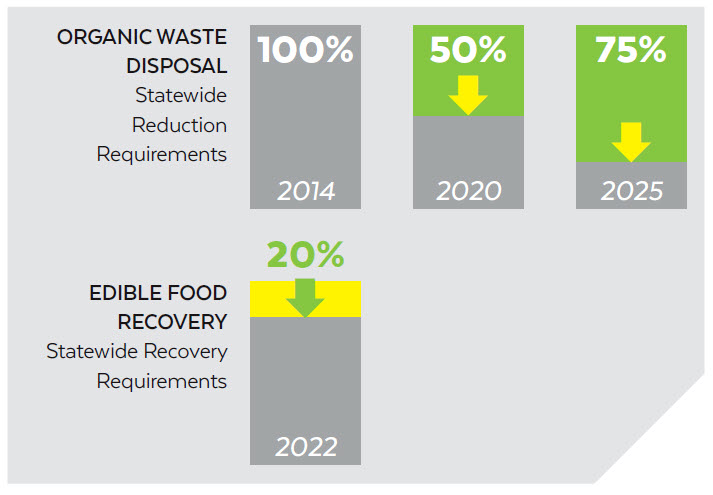Residential Organics Waste Recycling |
SB 1383 will revolutionize
how we dispose of organic materials in California by requiring residential organics waste recycling
in nearly every jurisdiction. The measure ultimately requires a 75 percent reduction of the level
of statewide disposal of organic waste by 2025, based on levels from 2014.
Additionally, jurisdictions will need to implement programs to recover 20 percent of commercial
edible food from disposal. A jurisdiction may designate a public or private entity to fulfill many
of its responsibilities, but the jurisdiction is ultimately
responsible for compliance with the requirements of SB 1383.

Try the 1383 Check-up Tool!
Section 1- Required Organic Waste Collection Program – Ordinances and Enforcement Mechanism
Section 2 – Edible Food Recovery Program
Section 3 – Additional SB 1383 Measures
Next Steps
Section 1- Required Organic Waste Collection Program – Ordinances and Enforcement Mechanism
By January 1, 2022, jurisdictions must have a required organic waste collection program and adopt
ordinances or similarly enforceable mechanisms associated with the program. Failure to do so can result in
penalties of up to $10,000 per day for each requirement listed. What is the status of developing and/or
updating ordinances within your municipal code or developing other enforceable mechanisms for each of
the following program requirements (section 18981.2(a) & 18988.1(b)).
Section 2 – Edible Food Recovery Program
Jurisdictions shall implement an edible food recovery program, including identifying adequate local food
donation capacity, monitoring and enforcing compliance of food generators and food recovery
organizations, and reporting and tracking food recovery program compliance. Failure to do so can result in
penalties of up to $10,000 per day for each requirement listed. What is the status of developing an edible
food recovery program? (section 18991).
Section 3 – Additional SB 1383 Measures
In addition to organics waste collection and edible food recovery, SB 1383 requires that jurisdictions comply with many other measures, including education, oversight, monitoring, enforcement, and citation of property and business owners, organic waste generators, haulers, and commercial edible food generators that do not comply. This section identifies other requirements of SB 1383 that carry associated penalties of up to $10,000 per day if not met by the deadlines. What is the status of the following requirements?
Next Steps
Remember that it can take many months to adopt these changes, so plan accordingly. Prior to adopting or revising
ordinances and contracts, make sure that the proposed changes will meet CalRecycle requirements by checking with your
local representative. All activities, including education, oversight, monitoring, enforcement, and citation mechanisms of
property and business owners, organic waste generators, haulers, and commercial edible food generators must be in
place by the deadlines. Once you have identified program requirements that need to be updated or implemented, ensure
adequate time to fully roll-out the programs and ensure compliance. Programs must be in place by January 1, 2022. It is
important to get started early.If you need assistance, you can check the CalRecycle website for available templates. If you don’t have a consultant that
currently assists you, please contact Go2Zero Strategies to learn about the variety of education and outreach programs,
business technical assistance, and reporting and compliance services offered. Please Complete a 3 Question Survey
Please Complete a 3 Question Survey.
Copyright 2019, Go2Zero and Mobius Intelligent Systems, LLC. All rights reserved.
Developed with open source software on solar powered servers by Mobius Intelligent Systems.
